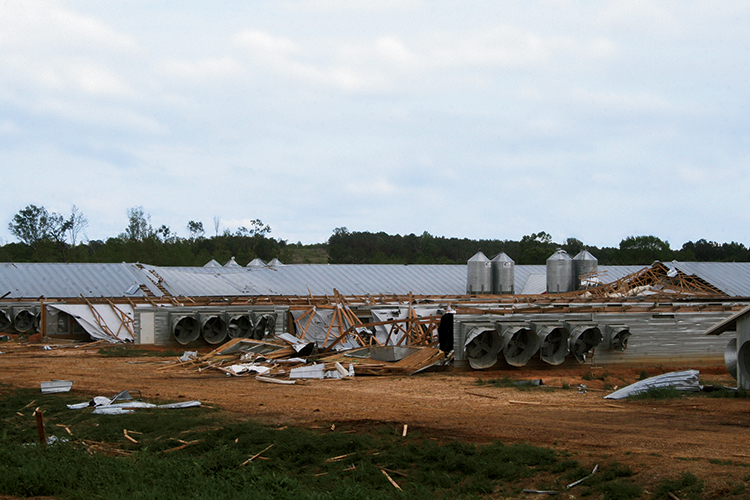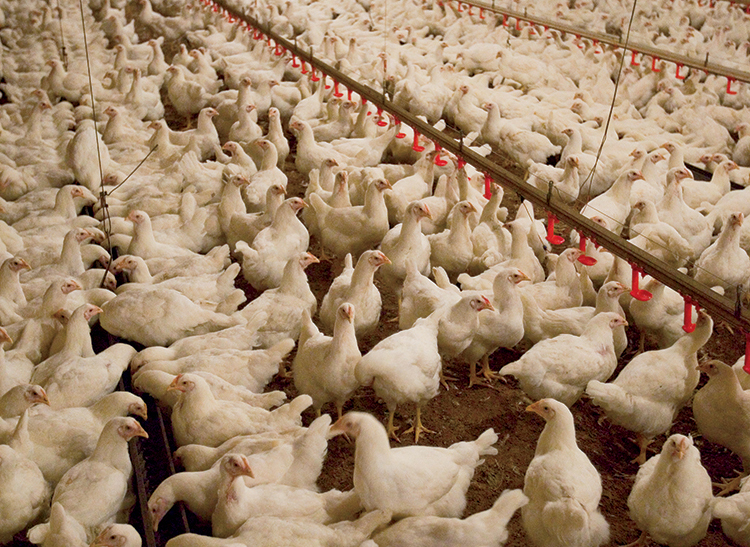Home > Mississippi > Mississippi Crops & Livestock > Weathering the Storm
Weathering the Storm
In partnership with: Mississippi Department of Agriculture and Commerce

On the afternoon of April 28, 2014, Noxapater farmer Charlie Wilkes was out picking up feed pans in his eight poultry houses when his wife Cindy called to warn him of an approaching storm.
“I came in the house at about 4 p.m., and 10 minutes later, the tornado warnings sounded,” Charlie recalls.
The couple fled to their underground storm shelter in the floor of their two-car garage with their daughters – Joleigh, 17, and Jenna, 12.
Within minutes, a tornado tore through their farm. They could feel the shelter shake and heard what sounded like “jet airplanes flying overhead.” The metal door over their heads rolled up with the wind and debris flew into the shelter.
“The pressure from the tornado was so great, it made my head hurt,” Charlie says. “When the shelter door rolled up, we could see that the carport was gone.”

A Farm Destroyed
That was just the beginning. The family emerged from the shelter to find they had lost their home, compost shed, hay barn, two cow barns and all eight of their poultry houses. More than 220,000 dead chickens littered the ground.
As a contract grower for Tyson, Wilkes raises chickens for 38 days or until they mature to four-and-a-half pounds.
His eight aluminum- and wood-framed poultry houses held 28,500 broiler chickens apiece. Other growers in the area also lost birds.
Ray Ables, a production manager for Tyson, says the company has more than 1,500 contracted chicken houses in Mississippi.
Thirty were destroyed in the April tornado and 10 more were badly damaged.
Consumer Impact
Weather events such as this one can have a ripple effect all the way to the consumer, causing food shortages and higher prices. Fortunately, this one did not.
“We lost 400,000 broilers and 40,000 hens because of the storm,” Ables says. “These birds were at various stages of production and age and would have been processed at different weeks later on. There was a gap in processing when it came time to process those birds because they weren’t there. But because the ages and processing times were spread out over several weeks, we were able to maintain service to our customers with the help of our other locations’ supply.”
The hen houses that were destroyed meant a shortened local egg supply, but Tyson was able to get hatching eggs from other locations and hold their other hens longer to make up for the weekly eggs needed.
“If the tornadoes in April had picked 30 hen houses to destroy, our hatching egg supply would have been cut drastically,” Ables says.![Mississippi Poultry [INFOGRAPHIC]](https://eadn-wc01-4177395.nxedge.io/wp-content/uploads/2020/05/Screen-Shot-2014-12-08-at-5.05.51-PM.png)
Weather’s Effect on Agriculture
Droughts and extreme temperatures also take their toll on farmers, sometimes all the way to grocery store shelves.
Tom Tabler, extension professor in the Poultry Science Department at Mississippi State University, says last winter’s extremely cold temperatures meant many poultry producers had to spend a lot of their income on propane to heat their chicken houses.
“Consumers don’t always realize how much the food they buy is tied to the weather,” Tabler says. “Droughts, for example, cause us to pay higher prices because the weather patterns cause the food supply to decrease. If people don’t live closely to agriculture, they usually don’t understand how much the weather affects their food – whether they’ll have access to it, and if they do, can they afford it? We all depend on farmers for our food, but farmers are at the mercy of Mother Nature.”
After the April tornado, Tabler helped coordinate relief efforts in Louisville, moderating informational meetings and matching up storm victims with representatives from the Federal Emergency Management Agency, Mississippi Emergency Management Agency, Mississippi Board of Animal Health, as well as other state and federal agencies.
“At times, it seemed like chaos. The initial shock had to wear off and people had to get their bearings,” Tabler says. “I had seen chicken houses blown away by tornadoes before, but never to this extreme with whole farms gone.”
The week after the storm, Tyson team member volunteers worked in shifts to prepare more than 20,000 protein-packed meals for storm victims and volunteers working in the Louisville area. Many team members who work at the Carthage facility and live in the Louisville area were directly affected.

Rebuilding a Farm
With the help of insurance, Charlie and Cindy Wilkes have rebuilt their poultry houses and were on schedule to receive their first supply of chickens from Tyson in November of 2014. Their house is yet to be rebuilt.
In the meantime, they are staying in a cabin that belongs to Cindy’s parents. Despite all the hardships they’ve faced, Charlie has managed to keep a sense of humor.
“I tell everybody now, ‘Don’t ever second-guess nature,’” he says, then chuckles. “My wife had been wishing for a remodeled kitchen. I told her, ‘Be careful what you wish for.’”
The Wilkes want to thank everyone who helped with cleanup.
“There was debris everywhere, and our neighbors, community, churches, Tyson employees and Samaritan’s Purse came to help us,” Charlie says.
Tabler says Mississippi farmers who suffered damage had to first assess if they even wanted to rebuild.
“But they love what they do so much, and they want it to be there for future generations, so they’re willing to risk it all again,” Tabler says. “They’re undeterred and ready to rebuild.”



